© 2026 ALLCITY Network Inc.
All rights reserved.

With a big swing for the fences, the Denver Broncos have hired their new offensive coordinator, Rich Scangarello—he of no prior NFL play-calling experience and only four seasons of NFL coaching under his belt—to fix an offense that’s been ailing the franchise since before Super Bowl 50.
A big part his intrigue, beyond being a Kyle Shannahan disciple, is what Scangarello was able to do in getting Jimmy Garroppolo ready in a few weeks to go on a 5-0 stretch at the end of 2017, and his work in grooming third-stringer Nick Mullens into a quality young starter in 2018.
More than anything else, his work with quarterbacks has become his calling card in a brief NFL career, a very appealing trait for a Broncos team that must figure out the quarterback position before anything else.
Having never had experience as an NFL play-caller, we went back to Rich’s most recent collegiate stop in Staten Island, NY at Wagner College, where he utilized more of the college concepts that have become all the rage in the modern NFL. We also brushed up on some San Francisco 49ers tape, to see what made Mullens and Garrappolo so successful under the Broncos newest OC and how that offense has taken the old Shanahan attack and made it more dynamic and modern.
Here’s what we found.
The Old College Try
When watching Scangarello’s most recent work as a play caller, this quote on Kyle Shanahan’s offense from back in 2017 really stood out.
“I would say the one thing I could truly appreciate beyond anything with coach Shanahan is that he’s trying to score on every single play he calls, and I never thought that way as a play caller in the pass game. Sometimes, I was thinking more about staying on schedule. And he was always thinking, ‘How can we attack the defense and create explosive plays?’ It really changed my mindset for the better.”
In studying Scarngarello’s tape in his first and only season as a play caller after his apprenticeship under Shanahan in Atlanta back in 2015, it was clear he took that adage to heart, calling a ton of vertical routes and trying to always keep defenses on their heels.
Even in a lower level FCS setting like Wagner, Scangarello was using lots of Shanahan’s typical zone runs in two-back or two-tight-end sets, running play-action bootlegs off of it, and playing his quarterback under center much more often than most modern college football offenses do. All staples of the Shanahan offense that the Broncos have been running since the late 90s.
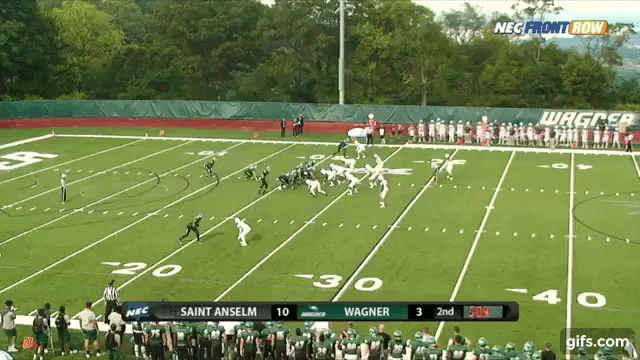
Scangarello would also sprinkle in spread formations with four wide receivers calling for more vertical routes and also mixed in a decent amount of 11 personnel out the gun, with trips to one side and often attacking the empty side.
Wagner would also run more typical college sets, with RPOs, read options, and quick screens.

He also ran some creative spread stuff like this nifty play-action pass, that looks like and RPO, and has a double screen option for the QB as the cornerbacks drop back in coverage. The motion by the fullback to put even more focus on the backfield, as he comes across the QB to block right as the fake handoff occurs, is another nice little wrinkle.
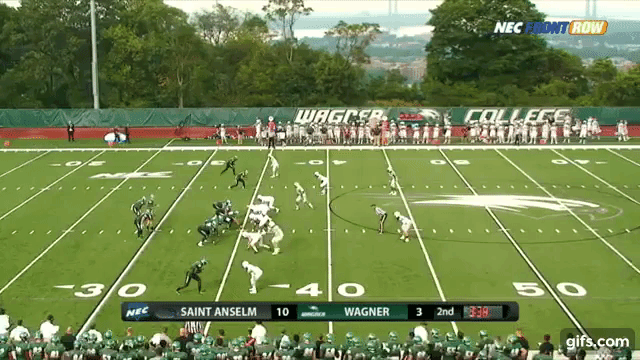
The 46-year old first-time NFL OC was also unafraid to go up-tempo in the spread if he needed a quick score.
Much like you’ll see the Rams do, Scangarello likes to use a few jet sweeps to spread defenses laterally, opening up space vertically for the passing game later on.
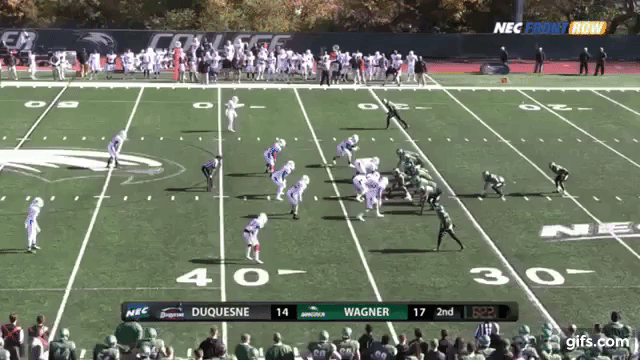
Just like Sean McVay does, Scangarello would then fake that same jet sweep and fake handoff under center, and throw on play action off of it. All subtle layers that the offense works off of and makes it hard to key in on.
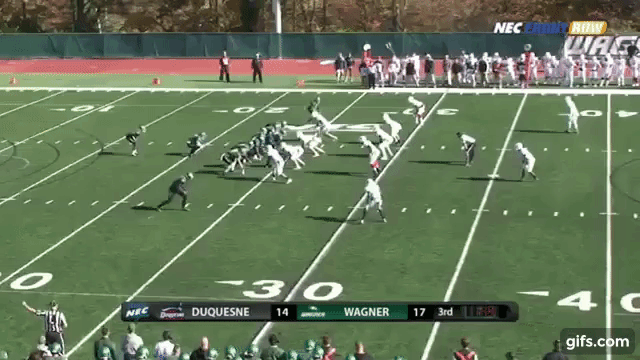
His playbook showed a nice blend of college spread concepts and lots of what Shanahan does, the kind of blend the Broncos hope they can get, especially if they draft a quarterback in 2019.
What truly stood out from the Wagner tape was how many pro-style concepts Scangarello was already running at an FCS program in just one year of being the OC. Spread and air raid offenses have primarily been adopted in the NCAA because they’re easier to install and simplify the game. Rather than following that trend, Scangarello, as he has done in the pros, was able to install a diverse and more sophisticated offense, and made it work.
While more spread looks from his college days would make him a sexier film study, Scangarello’s ability to get his players quickly familiarized with his playbook and executing at a high level, in a short amount of time, really stood out.
What he can adopt from the Niners offense
Let’s face it, the Wagner tape isn’t what got Scangarello hired here. If he already brought the Shanahan offense to the college ranks, after two more years as a quarterbacks coach in San Francisco, Rich is bound to bring a lot of the 49ers offense with him to Denver.
An appealing trait of that Niners offense is how in 2018 they seemed to play some of their best football against the AFC West, averaging 26 points per game in four matchups that saw three different starting QBs, compared to the Broncos pitiful 18.6 PPG in their division.
Shanahan’s offense still has its roots firmly set in what Gary Kubiak and Mike Shanahan attack did in the past. The scheme remains predicated on the run and utilizing lots of 12 and 21 personnel sets—two TEs or two RBs—with the fullback heavily featured, plenty of throws under center, play-action fakes, and a whole lot of bootlegs.
However, what the young Shanahan has done is modernize his mentor’s offense with more shotgun and three-receiver sets, adding a few more spread concepts as well.
What really stands out is the misdirection that is implemented pre-snap and the phenomenal job the Niners did of overloading zones, putting underneath defenders in tough spots and forcing them to rapidly chose between two receivers to cover in their zone. You can see why new Broncos head coach Vic Fangio, who’s big on covering with his backers, would like this offense as it puts so much strain on the linebackers in coverage.
The tight end plays a big part in this, taking underneath defenders away from receivers which can leave momentary holes that lead to big gains.
Shanahan also used that jet sweep action and misdirection a good amount, not as much as McVay, but almost.
Remember the jet sweep Scagnello ran at Wagner and the play action pass he ran off of that? In San Francisco, they threw in yet another variation with an outside toss to the RB that led to this beauty. Just imagine Phillip Lindsay running plays like this in Denver with Garett Bolles getting out in space as his lead blocker.
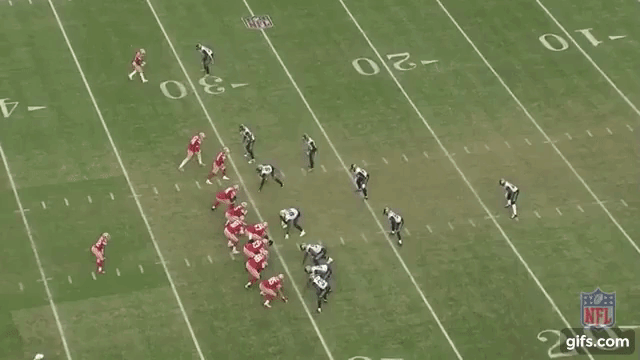
You might also remember this TD against the Broncos which is essentially the same play we featured above at Wagner, with a play-action pass off the double jet sweep.
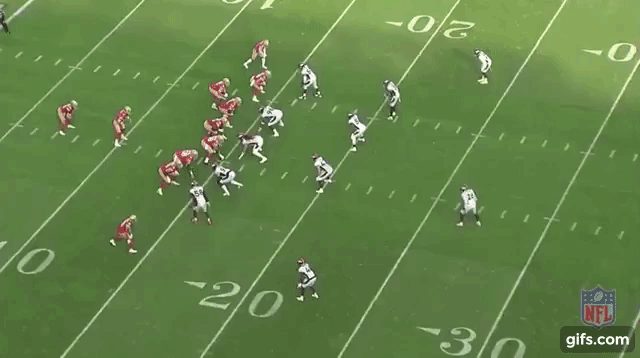
These are the sort of misdirection plays that make life easier on a quarterback and much harder on the defense. Exactly what the Broncos have needed more of the last few seasons.
In adjusting to Jimmy G, the Niners staff implemented tons of pre-snap motions, allowing the QB to identify coverages pre-snap. For C.J. Beathard and Mullens, they incorporated some RPOs, leading to this beautiful TD below.
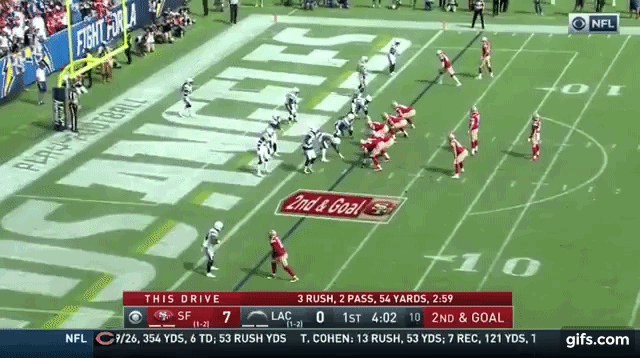
This play is a great example of the modernization of the Kubiak and Shanahan West Coast offense, in a look that’s more like what Clemson or Oklahoma might run.
The Niners would also attack off coverage with quick hitting screens or slants, much like Peyton Manning or spread attacks will and will throw in creative four-wide formations in the red zone. All wrinkles that the old version of the offense would seldom implement.
When studying film, it was incredibly telling how the Niners were able to manufacture lots of yards for their QBs, scoring an impressive amount of wide open touchdowns which were more due to good design and execution rather than talent on the field.
Watch how the route out the backfield and the vertical route outside clears out space for this wide open score. This is what we mean by overloading zones.
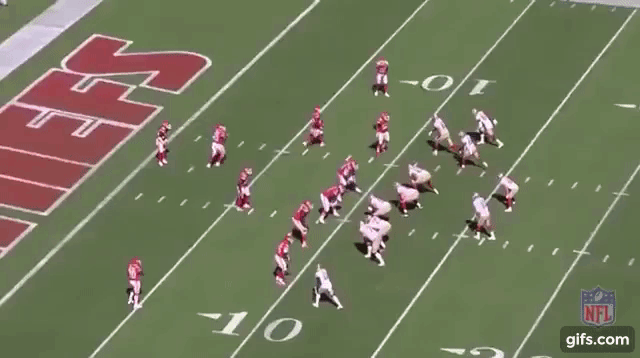
Below, you see how the fullback motions into a tight end position, creating confusion and freeing him up down the sideline for another open score.
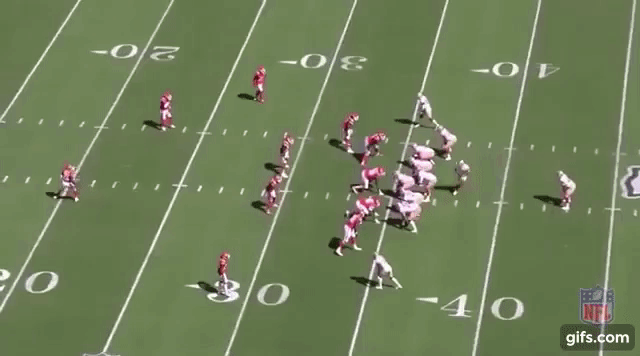
Those wide open TDs were all a product of misdirection, balance between the run and pass, and constantly stressing defenders. Heck, the Niners played the Jacksonville Jaguars ‘D’ late in 2017, when the Jags were one of the best defenses in the NFL, and scored 44 points without really any spectacular throws from Garroppolo, just great design and play calling.
It shouldn’t go unnoticed that the Niners set defenses up masterfully with these types of concepts and it’s clear to see why Kyle Shanahan remains such a respected play caller despite a losing record in his head coaching tenure.
The big question with Denver’s new OC is if he’ll be able to play possum and set defenses up the same way, despite a lack of play-calling experience at the NFL level and limited exposure. If he can, the sky’s the limit for this scheme in Denver.
What does this mean for Broncos’ roster?
Before even getting into how the new OC’s system will impact the roster going forward, the first big question is how Scangarello will marry zone-run concepts with new offensive line coach Mike Munchak’s gap-run scheme?
Munchak has coached zone schemes before, so he’ll be able to adapt pretty easily, but offensive line coaches often play the role of run-game coordinators, and the experienced Munchak should definitely be someone Scangarello can lean on. Both have shown they can be adaptable, for the best results, that’ll have to occur in Denver, too.
As Broncos fans know, this offense is at it’s best with a mismatch tight end. Guys like Shannon Sharpe, Owen Daniels, and now Kittle, who can separate from linebackers and create big plays in the passing game.
While the Broncos have a still intriguing and unknown group of young tight ends, none truly fit that description. The TE class in the draft is deep and full of talent, and Jared Cook will be another appealing option in free agency. Don’t be surprised if the Broncos look to upgrade this offseason.
Scangarello could also utilize a bit more speed at wide receiver, especially if Emmanuel Sanders were to get cut. That speed can stretch defenses and force jet sweep fakes to be respected by defenses, making the whole scheme more dynamic. There will be plenty of options in the offseason to address that lack of speed.
In both his last college stop at Wagner and his two seasons with the 49ers, Scangarello always had a mobile quarterback, something that typically suits this offense best with the boot plays they run and even the added RPOs.
It’s not a requirement, but having a mobile QB would be ideal for this offense. Case Keenum is mobile enough and so are most of the top draft prospects in the 2019 QB class. Interestingly enough, maybe the least mobile of all is the consensus top QB in 2019, Dwayne Haskins.
The Broncos ran this same offensive system just two seasons ago, so the impact on the roster shouldn’t be significant. As much as GM John Elway might’ve wanted to modernize, he also remains loyal to the West Coast zone-run offense that’s won him all three rings he has as a player and GM. With Scangarello, No. 7 might have found just the right guy to bring his old trusted attack back and give it some much-needed updates.
Time will tell if the OC has the play-calling chops to make it all work, but his scheme is certainly worth getting excited about.
Comments
Share your thoughts
Join the conversation



